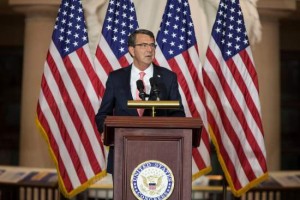
Pentagon moves closer to allowing transgender troops to serve
WASHINGTON — Defense Secretary Ash Carter on Monday issued two directives moving the Pentagon closer to allowing transgender men and women to serve openly in the military.
First, Carter ordered the creation of a Pentagon working group “to study over the next six months the policy and readiness implications of welcoming transgender persons to serve openly,” Carter said in a statement released Monday afternoon.
Carter also said that all decisions to dismiss troops with gender dysphoria would be handled by Brad Carson, the Pentagon’s acting under secretary of Defense for personnel and readiness. In recent months, all of the uniformed services have moved that decision to their highest levels.
“At my direction, the working group will start with the presumption that transgender persons can serve openly without adverse impact on military effectiveness and readiness, unless and except where objective, practical impediments are identified,” Carter said.
Senior brass have been skeptical of changing the transgender policy, arguing in private that the services have undergone rapid change in recent years and needed time to adjust to them, according to two Defense officials who spoke on condition of anonymity because they were not authorized to speak publicly. They pointed to the ban on gay and lesbian troops being lifted and women being integrated into previously closed combat fields.
The military has been moving closer to allowing transgender troops to serve openly. There are an estimated 15,500 transgender troops serving now.
Carter has hinted that he favors changing the policy since taking over the top job at the Pentagon.
In February, Carter said he was “very open-minded” about who should be able to serve provided “they can do what we need them to do for us.” He added: “I don’t think anything but their suitability for service should preclude them.”
Troops with gender dysphoria, a recognized medical condition, are barred from serving in the military for medical reasons. The Army in March was the first of the services to chip away at that ban. In February, the Army also approved hormone treatments for Chelsea Manning, the transgender soldier convicted of divulging a trove of classified information to WikiLeaks.
Last December, Air Force Secretary Deborah Lee James said she favored ending the ban.
This is the same playbook the Pentagon used to dismantle Don’t Ask Don’t Tell, the ban on gay troops in the military, by forcing commanders intent on discharging troops to make their case to the highest levels of civilian leadership. That is considered a risky career move.
Carter’s language about the review, also the strategy used to erase Don’t Ask Don’t Tell, was stated even more emphatically in favor of transgender troops. It presumes they can serve and puts the burden on opponents to argue why they should be banned.
It’s unclear how many transgender troops have been discharged because the Pentagon does not track that figure.
Carter’s announcement received early support from Rep. Adam Smith of Washington, the top Democrat on the House Armed Services Committee.
“I applaud Secretary Carter’s decision to establish a working group to study the policy and readiness implications of allowing transgender persons to serve openly,” Smith said. “The brave men and women who serve in our military should not be excluded from the rights and freedoms that they risk their lives to protect. It’s that simple.”
USA TODAY has reported that transgender troops serve in all aspects of the military, from special operations to administrative positions. Until the last year, many served quietly in fear that their gender identification would force them out of service. In many cases, however, they served with the knowledge of their colleagues and superior officers.





Leave a Reply